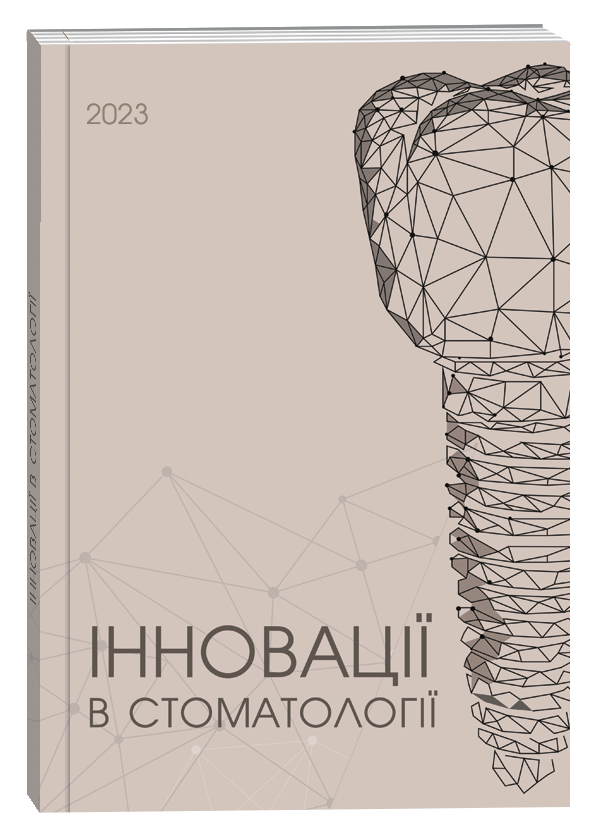SYSTEMIC INFLAMMATION INDEXES AS NEW PREDICTORS OF RECURRENCE OF INFLAMMATORY DISEASES OF THE ORAL MUCOSA IN POST-COVID-19 SYNDROME
DOI:
https://doi.org/10.35220/2523-420X/2025.1.10Keywords:
COVID-19; Post Covid Syndrome; biomarker; systemic immune-inflammation index; aggregate index of systemic inflammation; systemic inflammation response indexAbstract
Purpose of the study. To assess the relationship of systemic immune inflammation by blood biomarkers – SII, AISI, SIRI and to determine the role of their levels in patients with oral manifestations of post-COVID-19 syndrome.Research methods. The study involved 83 patients (main group) who visited the dental department and had oral manifestations of post-COVID-19 syndrome with typical complaints of pain, bleeding gums, single or multiple erosions. Recurrent herpetic stomatitis was diagnosed in 51 patients, and chronic recurrent aphthous stomatitis occurred in 32 patients. The control group included 35 patients with similar clinical characteristics without a history of COVID-19. Blood samples were collected for assessment of total and differential white blood cell count using a HEMIX-5 automated hematology analyzer (SFRI, France). The degree of systemic inflammation was assessed by calculating the systemic immune inflammation index SII, the total systemic inflammation index AISI, and the systemic inflammation response index SIRI.Scientific novelty. The study found that patients with post-COVID-19 syndrome had higher white blood cell count, along with higher neutrophil and monocyte counts than the control group. However, patients with post-COVID syndrome had lower white blood cell count compared to patients without a history of COVID-19.The parameters of the hematological screening revealed a high level of SII in patients with oral manifestations of post-COVID syndrome compared to patients without a history of COVID-19. The value of the AISI in patients with prolonged COVID-19 was 1.93 times higher than in the control group. The systemic inflammation response index (SIRI) in patients with prolonged COVID-19 is 59.1 % higher than in patients without a covid history.
References
Tang N., Kido T., Shi J., McCafferty E., Ford J. M., Dal Bon K., Pulliam L. Blood Markers Show Neural Consequences of LongCOVID-19. Cells. 2024. No 13(6). P. 478. URL: https://doi.org/10.3390/cells13060478
Thaweethai T., Jolley S. E., Karlson E. W., Levitan E. B., Levy B. et al. Development of a Definition of Postacute Sequelae of SARS-CoV-2 Infection. JAMA. 2023. No 329(22). Р. 1934–1946. URL: https://doi.org/ 10.1001/jama.2023.8823
WHO. A clinical case definition of post COVID-19 condition by a Delphi consensus. URL: https://www.who.int/publications/i/item/WHO-2019-nCoV-Post_COVID-19_condition-Clinical_case_definition-2021.1
Lippi G., Sanchis-Gomar F., Henry B.M. COVID- 19 and its long-term sequelae: what do we know in 2023? Pol Arch Intern Med. 2023. No 133(4):16402. URL: https://doi.org/10.20452/pamw.16402
Hill E. L, Mehta H. B, Sharma S., Mane K., Singh S. K. et al. Risk factors associated with post-acute sequelae of SARS-CoV-2: an N3C and NIH RECOVER study. BMC Public Health. 2023. No 23(1). P. 2103. URL: https://doi.org/10.1186/s12889-023-16916-w
Stephenson T., Allin, B., Rojas, N., Dalrymple, E., Pinto Pereira et al. Long COVID (post-COVID-19 condition) in children: a modified Delphi process. Archives of Disease in Childhood. 2022. No 107(7). P. 674–680. URL: https://doi.org/10.1136/archdischild-2021-323624
Peter R. S., Nieters A., Göpel S., Merle U., Steinacker J.M. et al. Persistent symptoms and clinical findings in adults with post-acute sequelae of COVID-19/ post-COVID-19 syndrome in the second year after acute infection: A population-based, nested case-control study. PLoS Med. 2025. No 22(1). e1004511. URL: https://doi.org/ 10.1371/journal.pmed.1004511
Baissary J., Koberssy Z., Ailstock K., Cummings M., Funderburg N. T., McComsey G. A. Vitamins K2 and D3 Improve Long COVID, Fungal Translocation, and Inflammation: Randomized Controlled Trial. Nutrients. 2025. No 17(2). P. 304. URL: https://doi.org/10.3390/ nu17020304
Atieh O., Daher J., Durieux J. C., Abboud M., Labbato D. et al. Vitamins K2 and D3 Improve Long COVID, Fungal Translocation, and Inflammation: Randomized Controlled Trial. Nutrients. 2025. No 17(2). P. 304. URL: https://doi.org/10.3390/nu17020304
Akın Y., Karasu M., Deniz A., Mirzaoğlu Ç., Bolayır H.A. Predictive value of the systemic immune inflammatory index in cardiac syndrome x. BMC Cardiovasc Disord. 2023. No 23(1). P. 146. URL: https://doi.org/10.1186/s12872-023-03157-3
Candemir M., Kiziltunç E., Nurkoç S., Şahinars lan A. Relationship Between Systemic Immune-Inflammation Index (SII) and the Severity of Stable Coronary Artery Disease. Angiology. 2021. No 72(6). P. 575–581. URL: https://doi.org/10.1177/0003319720987743
Hu B., Yang X. R., Xu Y., Sun Y. F., Sun C. et al. Systemic immune-inflammation index predicts prognosis of patients after curative resection for hepatocellular carcinoma. Clin Cancer Res. 2014. No 20(23). P. 6212–6222. URL: https://doi.org/10.1158/1078-0432.CCR-14-0442
Yaşar E., Bayramoğlu A. Systemic Immune- Inflammation Index as a Predictor of Microvascular Dysfunction in Patients With Cardiac Syndrome X. Angiology. 2022. No 73(7). P. 615–621. URL: https://doi.org/10.1177/00033197221087777
Ustundag Y., Huysal K., Gecgel S.K., Unal D. Relationship between C-reactive protein systemic immune- inflammation index and routine hemogram-related inflammatory markers in low-grade inflammation. Int J Med Biochem. 2018. No 1(1). P. 24–28. URL: https://doi.org/10.14744/ijmb.2017.08108
Zhang C., Li M., Liu L., Deng L., Yulei X. et al. Systemic immune-inflammation index as a novel predictor of major adverse cardiovascular events in patients undergoing percutaneous coronary intervention: a meta-analysis of cohort studies. BMC Cardiovasc Disord. 2024. No 24(1). P. 189. URL: https://doi.org/10.1186/s12872-024-03849-4
Erdoğan M., Erdöl M. A., Öztürk S., Durmaz T. Systemic immune-inflammation index is a novel marker to predict functionally significant coronary artery stenosis. Biomark Med. 2020. No 14(16). P. 1553–1561. URL: https://doi.org/10.2217/bmm-2020-0274
Huang Y., Gao Y., Wu Y., Lin H. Prognostic value of systemic immune-inflammation index in patients with urologic cancers: a meta-analysis. Cancer Cell Int. 2020. No 20. P. 499. URL: https://doi.org/10.1186/s12935-020-01590-4
Zinellu A., Collu C., Nasser M., Paliogiannis P., Mellino S. et al. The Aggregate Index of Systemic Inflammation (AISI): A Novel Prognostic Biomarker in Idiopathic Pulmonary Fibrosis. J Clin Med. 2021. No 10(18). P. 4134. URL: https://doi.org/10.3390/ jcm10184134
Jiang Y., Luo B., Lu W., Chen Y., Peng Y. et al. Association Between the Aggregate Index of Systemic Inflammation and Clinical Outcomes in Patients with Acute Myocardial Infarction: A Retrospective Study. J Inflamm Res. 2024. No 17. P. 7057–7067. URL: https://doi.org/10.2147/JIR.S481515
Qi Q., Zhuang L., Shen Y., Geng Y., Yu S. et al. A novel systemic inflammation response index (SIRI) for predicting the survival of patients with pancreatic cancer after chemotherapy. Cancer. 2016. No 122(14). P. 2158–2167. URL: https://doi.org/10.1002/cncr.30057
Ru S., Luo Y. The association and prognostic value of systemic inflammatory response index with short and long-term mortality in patients with sepsis. Medicine (Baltimore). 2023. No 102(29). e33967. URL: https://doi.org/10.1097/MD.0000000000033967
Luo S., Liu Z., Jiao R., Li W., Sun J. et al. The associations of two novel inflammation indexes, systemic immune-inflammation index (SII) and system inflammation response index (SIRI), with periodontitis: evidence from NHANES 2009-2014. Clin Oral Investig. 2024. No 28(2). P. 129. URL: https://doi.org/10.1007/s00784-024-05529-1
Ren Z., Xue Y., Zhang H., Guo T., Yi W. et al. Systemic Immune-Inflammation Index and Systemic Inflammation Response Index are Associated With Periodontitis: Evidence From NHANES 2009 to 2014. Int Dent J. 2024. No 74(5). P. 1033–1043. URL: https://doi.org/10.1016/j.identj.2024.03.019
Cho U., Sung Y. E., Kim M. S., Lee Y. S. Prognostic Role of Systemic Inflammatory Markers in Patients Undergoing Surgical Resection for Oral Squamous Cell Carcinoma. Biomedicines. 2022. No 10(6). P. 1268. URL: https://doi.org/10.3390/biomedicines10061268
Костюк В. О. Прикладна статистика: навч. посібник. Харків: ХНУМГ ім. О. М. Бекетова. 2015. 191 с. URL: https://duikt.edu.ua/ua/lib/1/category/2139/view/1631
Palchevskyі T. V., Gevkaliuk N. O. Candida albicans colonization of the mucous membrane in acute manifestations of COVID-associated oral candidasis. Regulatory Mechanisms in Biosystems. 2025. 33(1). e25013. URL: https://doi.org/10.15421/0225013
Giron L. B., Peluso M. J., Ding J., Kenny G., Zilberstein N. F. et al. Markers of fungal translocation are elevated during post-acute sequelae of SARS-CoV-2 and induce NF-κB signaling. JCI Insight. 2022. No 7(18). e164813. URL: doi: 10.1172/jci.insight.164813. Erratum for: JCI Insight. 2022. No 7(15):e160989. URL: https://doi.org/10.1172/jci.insight.160989
Levy Y., Derazne E., Shilovsky A., Kagansky D., Derkath A. et al. Neutrophil to lymphocyte ratio and platelet to lymphocyte ratio, are they markers of COVID-19 severity or old age and frailty? A comparison of two distinct cohorts. Front Med (Lausanne). 2023. No 10. Р. 1222692. URL: https://doi.org/10.3389/fmed.2023.1222692
Гевкалюк Н., Пальчевський Т. Використання маркерів запалення для стратифікації захворювань слизової оболонки порожнини рота пацієнтів у постковідному періоді. Вісник стоматології. 2024. No 129(4). P. 2–8. URL: https://doi.org/10.35220/2078-8916-2024-54-4.1








